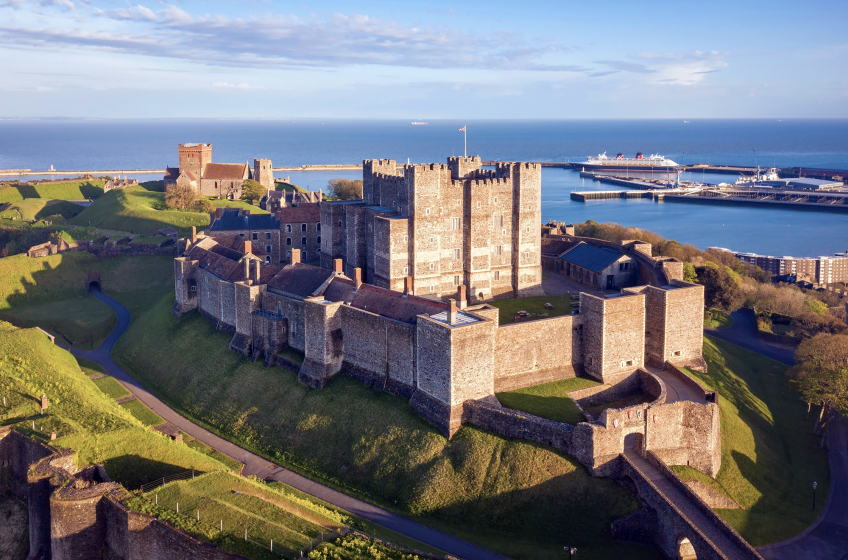Discover Dover | A Visitor's Introduction to Dover
Known primarily for its iconic white cliffs and strategic port, Dover serves as a gateway to Europe and a fascinating destination in its own right. From its ancient castle to its beautiful coastal walks, Dover offers a wealth of attractions for visitors to explore.
Recommended Dover Accommodation: Hotels Bed & Breakfasts Pub Accommodation
Dover Castle
Dover Castle, often referred to as the "Key to England," is one of the town's most prominent landmarks. This formidable fortress has stood guard over the English Channel for over 900 years. Visitors can explore the Great Tower, where medieval interiors bring the castle’s history to life, and delve into the network of secret wartime tunnels used during World War II. The underground hospital and Operation Dynamo exhibits offer a poignant glimpse into the role Dover played during the Dunkirk evacuation. With its breathtaking views of the Channel and extensive grounds, Dover Castle is a must-visit.
The White Cliffs of Dover
The White Cliffs of Dover are perhaps the most famous natural feature in the region, symbolising Britain’s resilience and beauty. Stretching along the coast, these chalk cliffs provide stunning views over the English Channel and, on clear days, even as far as France. The best way to experience the cliffs is by walking the scenic trails maintained by the National Trust. The visitor center at Langdon Cliffs offers informative displays about the area’s natural and historical significance, as well as a café with panoramic views.
South Foreland Lighthouse
Located atop the white cliffs, the South Foreland Lighthouse is a charming Victorian lighthouse with a rich history. It was the first lighthouse to use an electric light and played a crucial role in maritime navigation. Today, visitors can tour the lighthouse, learning about its history and enjoying the spectacular coastal views from the top. The nearby tea room, Mrs. Knott’s Tearoom, is perfect for a typically British cream tea after your visit.
Dover Museum and Bronze Age Boat Gallery
For a deep dive into local history, the Dover Museum is an excellent stop. The museum’s standout exhibit is the Bronze Age Boat, the world's oldest known seagoing boat, discovered in Dover in 1992. This remarkable artifact, dating back over 3,000 years, is displayed alongside interactive exhibits detailing its construction and the life of the people who built it. The museum also covers the town’s Roman and medieval history, providing a comprehensive overview of Dover’s past.
The Roman Painted House
Another fascinating historical site is the Roman Painted House, Britain’s best-preserved Roman house, featuring intricate wall paintings. These well-preserved murals offer a rare glimpse into Roman domestic life and artistry. The site provides informative tours and displays that bring to life the Roman history of Dover.
Dover Western Heights
For history and hiking enthusiasts, Dover’s Western Heights are a hidden gem. This extensive network of fortifications was built during the Napoleonic Wars and later expanded. The Grand Shaft, a unique triple staircase, is a highlight, offering a dramatic descent from the heights to the town below. The surrounding area is perfect for walks, combining historical exploration with beautiful natural scenery.
Samphire Hoe
Samphire Hoe is a unique nature reserve created from the material excavated during the construction of the Channel Tunnel. This stunning coastal park offers trails, wildlife spotting opportunities, and beautiful views of the cliffs and sea. It’s an excellent spot for picnicking, fishing, and simply enjoying the tranquility of the English coast.
Dining and Shopping
Dover offers a variety of dining options, from traditional English pubs to modern bistros. For seafood lovers, Hythe Bay Seafood Restaurant offers fresh, locally sourced dishes with fantastic sea views. The town centre has a range of shops and markets where visitors can find local produce, souvenirs, and more.
Practical Tips for Visiting
Dover is easily accessible by train from London, with regular services from St Pancras International and Victoria stations taking around 1.5 hours. The town is also a major ferry port, offering frequent crossings to Calais, France. For those driving, Dover is well-connected by road, with ample parking options. Accommodation in Dover ranges from charming bed and breakfasts to contemporary hotels, catering to various tastes and budgets.
Shortlist
- Your Shortlist is empty

